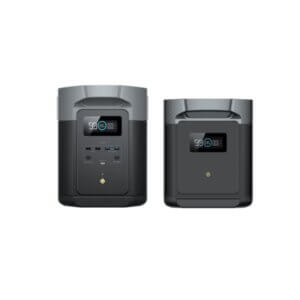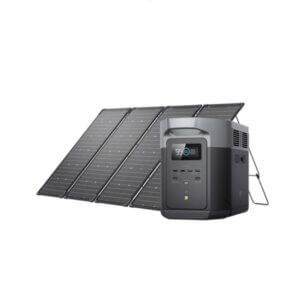
EcoFlow DELTA 2: Your Green Energy Storage Solution
When storm clouds form and power lines go down, most homes still turn to what seem like reliable fossil fuel generators, continuing a cycle of environmental destruction at life’s most precarious moments. But a change is afoot as the portable power station industry takes off like never before!
Customers are seeking dependable backup power solutions that won’t require them to compromise their environmental values or safety needs. With traditional batteries subject to a high risk of fire and conventional power storage harming the environment, it was only a matter of time before an industrial solution was needed to help maintain balance. Stacking blocks.
In a world where over ten million electric-powered vehicles are in use globally, the need for a robust battery infrastructure is more pressing than ever. Introducing the EcoFlow DELTA 2, a portable power station that is revolutionizing the way you store and use clean energy. This cutting-edge device combines state-of-the-art LiFePO4 battery technology with innovative charging features, offering a cleaner, greener solution to replace traditional backup power.
In this review series, we will explore how the DELTA 2’s green manufacturing and built-to-last safety engineering are pushing new heights in power transportation and enabling clean energy for all.
The Green Power Revolution: Why Energy Storage Matters
Newer data indicates that over 70% of households continue to rely on dirty fossil fuel generators in the event of an electrical outage, resulting in significant carbon emissions and local air pollution. One portable gas generator can spew as much CO2 in 24 hours as a car driven for 150 miles. This is particularly pronounced when widespread outages occur, with some communities reporting increases in air pollution of over 20% during prolonged blackouts.
An increasing number of extreme weather events underscores the importance of cleaner-tier backup power. Despite the strong 40% annual growth of the global market for renewable energy storage, legacy power solutions remain a resilient part of emergency preparedness. Existing portable power stations suffer from several significant drawbacks, including limited capacity, slow charging speeds, and long-term concerns about battery life.
Furthermore, many solutions available today do not effectively support connections with renewable energy sources and could represent an obstacle to the diffusion of energy conservation attitudes among sensitive customers. Top manufacturers, such as EcoFlow, are tackling the problem head-on, creating forward-thinking solutions that offer the reliability you demand, combined with an eco-friendly edge.
The move towards sustainable energy storage isn’t just a matter of environmental necessity, but an essential step in creating secure, future-proof power systems that cater to our energy-intensive lifestyles while safeguarding our Earth’s resources.
EcoFlow DELTA 2 Deep Dive: Technical Specifications

The EcoFlow DELTA 2 reinvents the way you go off the grid by providing a powerful capacity of 1024Wh and ensuring that it will have reserve power, even when you don’t have an option to charge it. That scalability makes it versatile enough for everything from a weekend camping trip to an extended backup power source for the home.
And, of course, the output makes up for it as well, with four AC outlets providing pure-sine power, multiple USB-A and USB-C ports that support fast charging protocols, and traditional DC outputs for compatibility with a wide range of devices.
Yet, the DELTA 2 remains impressively lightweight, featuring an intelligent handle and compact size (15.7 x 8.3 x 11.1 inches) for easy carrying. This second-generation model is 20% smaller and 30% more efficient than the original DELTA. The simple structure makes it a visually appealing device; the LED display simultaneously shows power monitoring and system status, helping you manage power use and save energy. This mix of greater capacity, more diverse charging options, and added portability makes the DELTA 2 an adaptable power solution for emergency backup or everyday carry.
LiFePO4 Battery Technology: The Safety & Sustainability Advantage
Chemistry Explained: Why LiFePO4 Outperforms
Lithium Iron Phosphate (LiFePO4) is a new generation of 12V cell, optimized in size per capacity. Its safety is well tested. Unlike regular cobalt-based lithium-ion batteries, LiFePO4 cells are inherently safe and will not thermally runaway even if punctured with a nail! Manufactured from the highest energy density cells, they can withstand higher temperatures before thermal runaway (the temperature at which an explosion occurs).
The chemistry utilizes earth-abundant resources, avoiding toxic heavy metals and minimizing ecological footprints throughout the manufacturing and disposal processes. Not only that, but these batteries also demonstrate outstanding durability, lasting over 80% of their capacity after 3000 charging cycles – nearly three times longer than the life of standard lithium-ion batteries.
Real-World Safety Protections
The DELTA 2 – Innovative BMS Technology. The DELTA 2 features an advanced BMS (Battery Management System) that provides comprehensive protection through highly intelligent and precise algorithms. Thermal sensors distributed around the battery pack monitor temperatures at all times, and if they rise to critical levels, cooling systems are engaged.
Intelligent voltage regulation prevents long-term overcharging by limiting input current when the battery is nearly fully charged, and under-voltage lockout helps prevent over-discharge damage to ensure long battery life. Furthermore, the BMS controls the recharging or stopping of recharging to the battery in cases of extreme temperatures to protect this equipment. In combination with short-circuit protection and cell-balancing technology, you get one of the safest portable power options available in the DELTA 2.
Multi-Source Charging: Harnessing Renewable Energy
Solar Charging Capabilities
It supports solar input of up to 500W and optimal recharging with Delta 1300. The battery can be fully charged with sunlight in 3.5 hours under good sunlight conditions and is capable of lasting up to 10 hours or more on a full charge. Built-in Maximum Power Point Tracking (MPPT) will enhance the load capacity, thereby increasing product life and performance. Directly connecting to a maximum of 18V high-voltage solar panels makes it reliable in all weather conditions, ranging from -40 to 85 degrees Fahrenheit. With this advanced technology, an energy conversion rate of up to 30% is achieved compared to the typical 15%.
Grid and Vehicle Charging
When solar charging is not available, the DELTA 2 nevertheless provides impressively fast AC charging – backing up to 80% battery in just 50 minutes thanks to the unique X-Stream charging technology. The smart charging algorithm scales down power draw to prevent the circuit from overloading and allows for tens of operations to be programmable to power off. For mobile use, an included car charger adapter ensures you can have high-voltage power while on the highway, by converting 12V or 24V DC power to provide the unit with power.
This flexibility is further boosted by the system’s intelligent charging management which automatically detects input sources and distributes the appropriate charging currents for optimal charging and extended battery life. By being able to charge with multiple sources, users can always stay connected with power and stay charged, whether from the grid or on-the-go vehicle charging.
Eco-Conscious Applications: Practical Usage Scenarios
From real-world sustainability applications, the EcoFlow DELTA 2 shows incredible adaptability. Users of off-grid photovoltaic solar can integrate the unit as their main power storage solution, while powering all critical home appliances with emissions-free power. In one such illustrative example in rural Colorado, generator run-time was reduced by as much as 90% after converting a solar system with DELTA 2.
For emergency preppers, the unit’s dependable lithium iron phosphate (LiFePO4) battery eliminates the need for hazardous gasoline-stored fuels, and multiple charging options ensure your gear remains operational during prolonged outages. Outdoor adventurers have revolutionized their wilderness experiences by retrofitting the roofs of their vans with solar panels, creating sustainable mobile power stations that can power refrigerators, charge laptops and coolers, and run cooking equipment — with minimal environmental impact. Compared to traditional gas generators, a DELTA 2 solar power configuration helps avoid approximately 1.3 tons of CO2 emissions per year (based on standard backup power use).
By utilizing the sun’s energy to charge the system during the day and enabling it to output energy even when there is no direct sunlight, the system can generate energy anytime, anywhere, and under any weather condition. Consequently, it will produce less environmental pollution than other systems.
The Future of Clean Energy Storage

Meanwhile, the EcoFlow DELTA 2 embodies a new age in portable power by offering unprecedented safety and eco-friendly battery chemistry with LiFePO4. This revolutionary system not only removes the harmful substances found in traditional batteries, but it also provides an unrivaled lifespan, considering the up to 3,000+ cycle life.
The flexible charging options, ranging from quick 500W solar charging to efficient grid and vehicle charging, deliver users unmatched power availability. With the DELTA 2, customers can minimize their carbon footprint by accessing eco-friendly, dependable, and safe energy storage that suits their lifestyle.
The era has ended for relying on fossil fuels as backup power and it’s time to move to clean energy solutions that safeguard our families and our planet. Join the green energy movement and be a contributor to the cause to fight climate change – the ability to make a difference is quite literally in your hands with the EcoFlow DELTA 2.